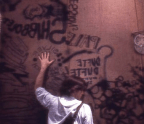
After a protracted absence, Todd Field is back, and with a film that more than compensates for the wait. However, Tár shouldn’t be gauged in terms of some value system based on the number of years that Field has gone without a new movie (16, following his second feature, Little Children [2006]), any more than the gap of years between new works by Field’s mentor, Stanley Kubrick, should have been a measure for his movies. Tár is, on its own and without any context for this particular filmmaker, a gigantic and bold film spilling over with ideas, emotions, and a sneakily transgressive notion that cinema can still express the biggest concepts on the most personal level while delivering a weighty entertainment.
It isn’t that Field has just stepped into the batter’s box and swung for the fences—though he has indeed done that—but that he has done so in such a precise way. Tár arrives at a moment when the art-cinema movie meant to play in larger venues than “specialty” houses, cinematheques, cine-clubs, museums, or festivals is being declared, effectively, dead. With a backer like Focus Features and a star like Cate Blanchett, Field knows that he has a wider range of responsibilities and pressures than fine-cinema artisans who know they will never be in an Oscar race. Given this, his movie is all the more astonishing for its brazen artistic daring on every level, never mind its willingness to run full throttle into the messy culture-war battles over workplace sexual harassment and how these intersect in complicated ways with the long-overdue elevation of women to positions of real power in culture and business.
This is Field’s first original produced screenplay, following a filmmaking career in which he’s collaborated with or adapted many serious fiction writers, including Andre Dubus (whose story “Killings” he adapted for [2001]), Tom Perotta (), Joan Didion (a political thriller titled ), Boston Teran (his Mexican Revolution novel, ), and Jonathan Franzen and David Hare (an unmade streaming series titled ). Most of these projects are unmade or discarded (accounting for much of the time in which Field has been out of view), but given that is such a notable leap forward from his fine two previously completed features, the sensitive viewer can possibly detect traces of all of that unrealized work in this one. This is particularly true in how the






